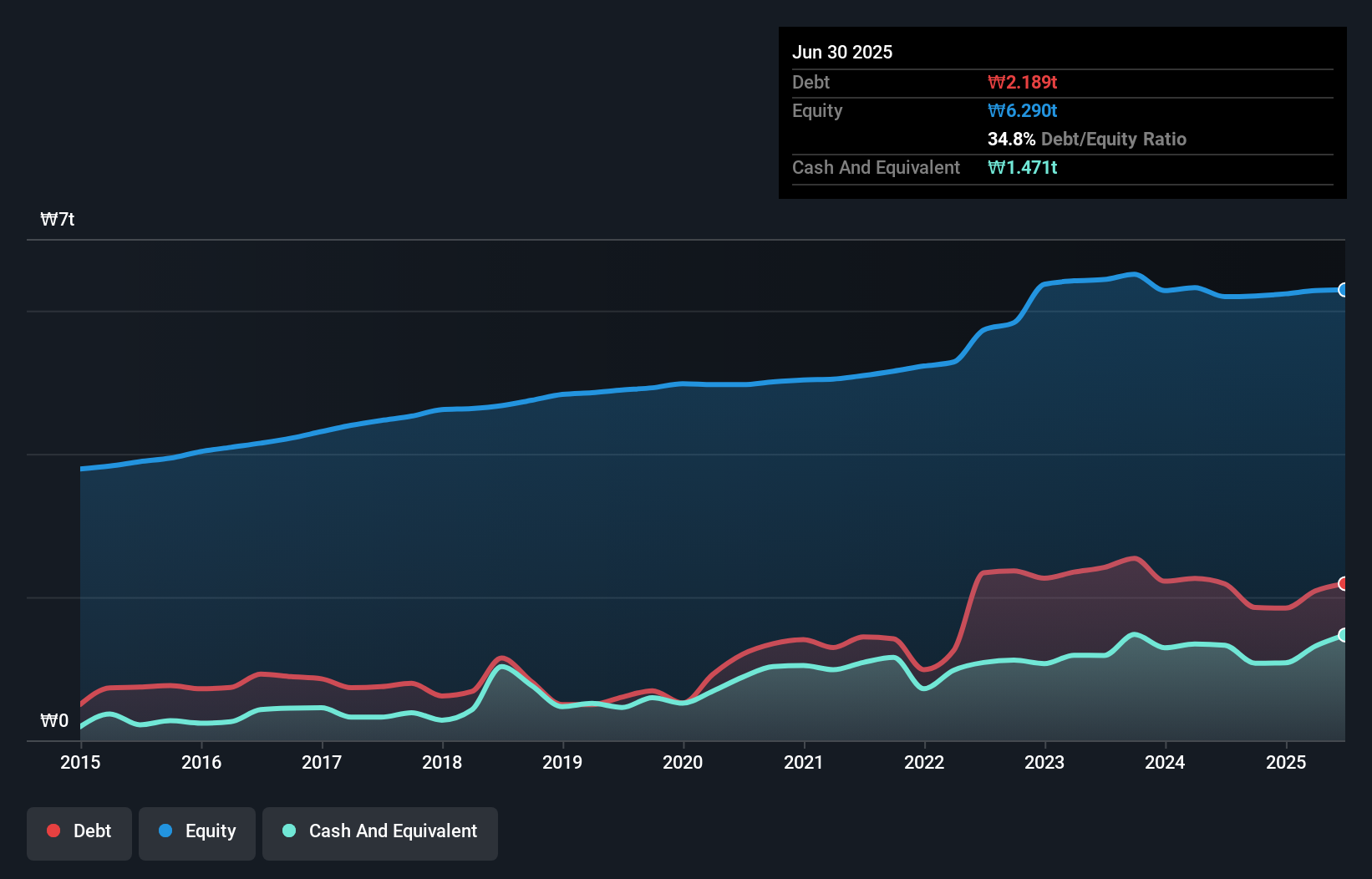- South Korea
- /
- General Merchandise and Department Stores
- /
- KOSE:A069960
Does Hyundai Department Store (KRX:069960) Have A Healthy Balance Sheet?
David Iben put it well when he said, 'Volatility is not a risk we care about. What we care about is avoiding the permanent loss of capital.' When we think about how risky a company is, we always like to look at its use of debt, since debt overload can lead to ruin. We can see that Hyundai Department Store Co. Ltd. (KRX:069960) does use debt in its business. But the more important question is: how much risk is that debt creating?
What Risk Does Debt Bring?
Generally speaking, debt only becomes a real problem when a company can't easily pay it off, either by raising capital or with its own cash flow. If things get really bad, the lenders can take control of the business. However, a more usual (but still expensive) situation is where a company must dilute shareholders at a cheap share price simply to get debt under control. By replacing dilution, though, debt can be an extremely good tool for businesses that need capital to invest in growth at high rates of return. The first thing to do when considering how much debt a business uses is to look at its cash and debt together.
What Is Hyundai Department Store's Debt?
The chart below, which you can click on for greater detail, shows that Hyundai Department Store had ₩2.19t in debt in June 2025; about the same as the year before. However, because it has a cash reserve of ₩1.47t, its net debt is less, at about ₩717.7b.

How Strong Is Hyundai Department Store's Balance Sheet?
The latest balance sheet data shows that Hyundai Department Store had liabilities of ₩3.66t due within a year, and liabilities of ₩1.30t falling due after that. On the other hand, it had cash of ₩1.47t and ₩871.2b worth of receivables due within a year. So its liabilities total ₩2.62t more than the combination of its cash and short-term receivables.
When you consider that this deficiency exceeds the company's ₩1.78t market capitalization, you might well be inclined to review the balance sheet intently. Hypothetically, extremely heavy dilution would be required if the company were forced to pay down its liabilities by raising capital at the current share price.
View our latest analysis for Hyundai Department Store
In order to size up a company's debt relative to its earnings, we calculate its net debt divided by its earnings before interest, tax, depreciation, and amortization (EBITDA) and its earnings before interest and tax (EBIT) divided by its interest expense (its interest cover). Thus we consider debt relative to earnings both with and without depreciation and amortization expenses.
Hyundai Department Store has net debt of just 0.89 times EBITDA, indicating that it is certainly not a reckless borrower. And this view is supported by the solid interest coverage, with EBIT coming in at 8.6 times the interest expense over the last year. In addition to that, we're happy to report that Hyundai Department Store has boosted its EBIT by 32%, thus reducing the spectre of future debt repayments. There's no doubt that we learn most about debt from the balance sheet. But it is future earnings, more than anything, that will determine Hyundai Department Store's ability to maintain a healthy balance sheet going forward. So if you want to see what the professionals think, you might find this free report on analyst profit forecasts to be interesting.
Finally, while the tax-man may adore accounting profits, lenders only accept cold hard cash. So the logical step is to look at the proportion of that EBIT that is matched by actual free cash flow. During the last three years, Hyundai Department Store produced sturdy free cash flow equating to 75% of its EBIT, about what we'd expect. This cold hard cash means it can reduce its debt when it wants to.
Our View
Hyundai Department Store's EBIT growth rate was a real positive on this analysis, as was its conversion of EBIT to free cash flow. But truth be told its level of total liabilities had us nibbling our nails. When we consider all the elements mentioned above, it seems to us that Hyundai Department Store is managing its debt quite well. But a word of caution: we think debt levels are high enough to justify ongoing monitoring. Above most other metrics, we think its important to track how fast earnings per share is growing, if at all. If you've also come to that realization, you're in luck, because today you can view this interactive graph of Hyundai Department Store's earnings per share history for free.
Of course, if you're the type of investor who prefers buying stocks without the burden of debt, then don't hesitate to discover our exclusive list of net cash growth stocks, today.
Valuation is complex, but we're here to simplify it.
Discover if Hyundai Department Store might be undervalued or overvalued with our detailed analysis, featuring fair value estimates, potential risks, dividends, insider trades, and its financial condition.
Access Free AnalysisHave feedback on this article? Concerned about the content? Get in touch with us directly. Alternatively, email editorial-team (at) simplywallst.com.
This article by Simply Wall St is general in nature. We provide commentary based on historical data and analyst forecasts only using an unbiased methodology and our articles are not intended to be financial advice. It does not constitute a recommendation to buy or sell any stock, and does not take account of your objectives, or your financial situation. We aim to bring you long-term focused analysis driven by fundamental data. Note that our analysis may not factor in the latest price-sensitive company announcements or qualitative material. Simply Wall St has no position in any stocks mentioned.
About KOSE:A069960
Hyundai Department Store
Operates various department stores, outlets, and duty-free shops in South Korea.
Undervalued with adequate balance sheet.
Market Insights
Community Narratives




